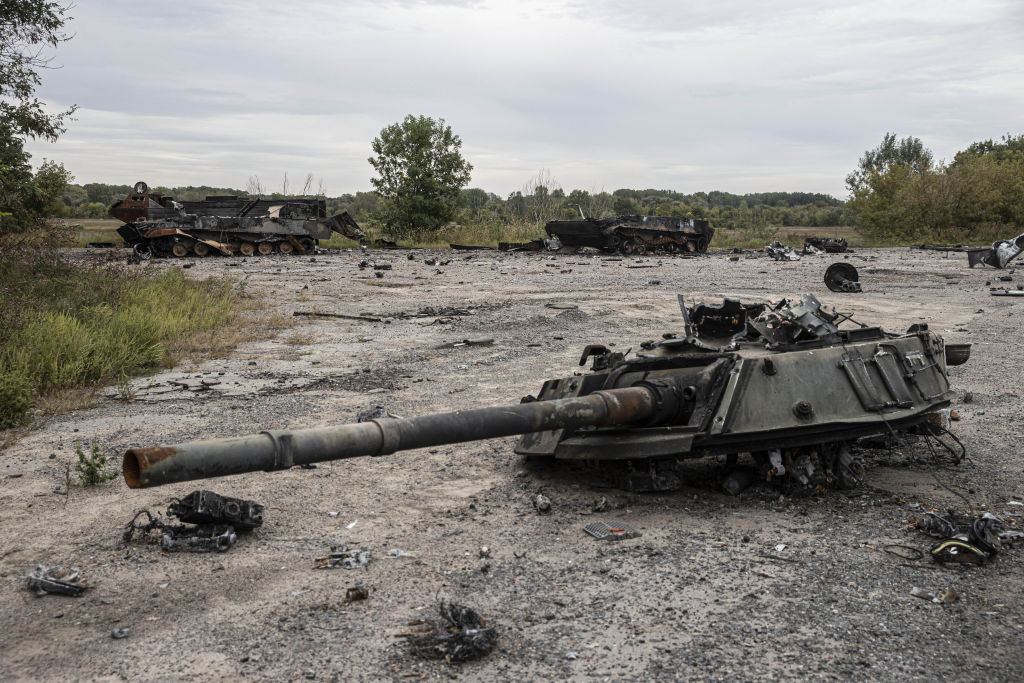Russia withdraws troops from Kharkiv region as Ukraine powers down final reactor at Zaporizhzhia


A free daily email with the biggest news stories of the day – and the best features from TheWeek.com
You are now subscribed
Your newsletter sign-up was successful
Russia's Defense Ministry said Saturday that Russian forces would withdraw from two areas in Ukraine's northeastern Kharkiv Oblast as a Ukrainian counteroffensive continues to gain ground, The Associated Press reports.
This withdrawal would constitute the most significant Russian retreat since invading forces pulled back from the capital city of Kyiv at the end of March. A Russian Defense Ministry spokesman said the withdrawn troops would be redeployed to the Donetsk region.
Also on Saturday, Ukrainian forces entered the strategic city of Izium, which Russia has held since April, according to CNN.
The Week
Escape your echo chamber. Get the facts behind the news, plus analysis from multiple perspectives.

Sign up for The Week's Free Newsletters
From our morning news briefing to a weekly Good News Newsletter, get the best of The Week delivered directly to your inbox.
From our morning news briefing to a weekly Good News Newsletter, get the best of The Week delivered directly to your inbox.
Serhiy Haidai, the Ukrainian regional governor of Russian-held Luhansk Oblast, suggested that the city of Lysychansk, which fell to Russian forces in July, could be Ukraine's next target.
On Sunday, the Ukrainian engineers that operate the country's Russian-held Zaporizhzhia nuclear power plant began powering down the facility's last operating reactor, according to NPR and The New York Times.
Energoatom, Ukraine's state-owned nuclear company, said in a statement that the sixth and final reactor would be "transfer[red] ... to the safest state — cold shutdown" for safety reasons as Russian and Ukrainian forces continue to clash in the vicinity of the nuclear plant.
This decision decreases the possibility of a meltdown but also means that the plant will have to rely on diesel generators to operate its safety equipment if further shelling severs the plant from external power again. The plant reportedly has enough fuel to operate these generators for just 10 days.
A free daily email with the biggest news stories of the day – and the best features from TheWeek.com
Grayson Quay was the weekend editor at TheWeek.com. His writing has also been published in National Review, the Pittsburgh Post-Gazette, Modern Age, The American Conservative, The Spectator World, and other outlets. Grayson earned his M.A. from Georgetown University in 2019.
-
 Why is the Trump administration talking about ‘Western civilization’?
Why is the Trump administration talking about ‘Western civilization’?Talking Points Rubio says Europe, US bonded by religion and ancestry
-
 Quentin Deranque: a student’s death energizes the French far right
Quentin Deranque: a student’s death energizes the French far rightIN THE SPOTLIGHT Reactions to the violent killing of an ultraconservative activist offer a glimpse at the culture wars roiling France ahead of next year’s elections
-
 Secured vs. unsecured loans: how do they differ and which is better?
Secured vs. unsecured loans: how do they differ and which is better?the explainer They are distinguished by the level of risk and the inclusion of collateral
-
 What is ‘Arctic Sentry’ and will it deter Russia and China?
What is ‘Arctic Sentry’ and will it deter Russia and China?Today’s Big Question Nato considers joint operation and intelligence sharing in Arctic region, in face of Trump’s threats to seize Greenland for ‘protection’
-
 What would a UK deployment to Ukraine look like?
What would a UK deployment to Ukraine look like?Today's Big Question Security agreement commits British and French forces in event of ceasefire
-
 Would Europe defend Greenland from US aggression?
Would Europe defend Greenland from US aggression?Today’s Big Question ‘Mildness’ of EU pushback against Trump provocation ‘illustrates the bind Europe finds itself in’
-
 Did Trump just end the US-Europe alliance?
Did Trump just end the US-Europe alliance?Today's Big Question New US national security policy drops ‘grenade’ on Europe and should serve as ‘the mother of all wake-up calls’
-
 Is conscription the answer to Europe’s security woes?
Is conscription the answer to Europe’s security woes?Today's Big Question How best to boost troop numbers to deal with Russian threat is ‘prompting fierce and soul-searching debates’
-
 Trump peace deal: an offer Zelenskyy can’t refuse?
Trump peace deal: an offer Zelenskyy can’t refuse?Today’s Big Question ‘Unpalatable’ US plan may strengthen embattled Ukrainian president at home
-
 Vladimir Putin’s ‘nuclear tsunami’ missile
Vladimir Putin’s ‘nuclear tsunami’ missileThe Explainer Russian president has boasted that there is no way to intercept the new weapon
-
 The Baltic ‘bog belt’ plan to protect Europe from Russia
The Baltic ‘bog belt’ plan to protect Europe from RussiaUnder the Radar Reviving lost wetland on Nato’s eastern flank would fuse ‘two European priorities that increasingly compete for attention and funding: defence and climate’
